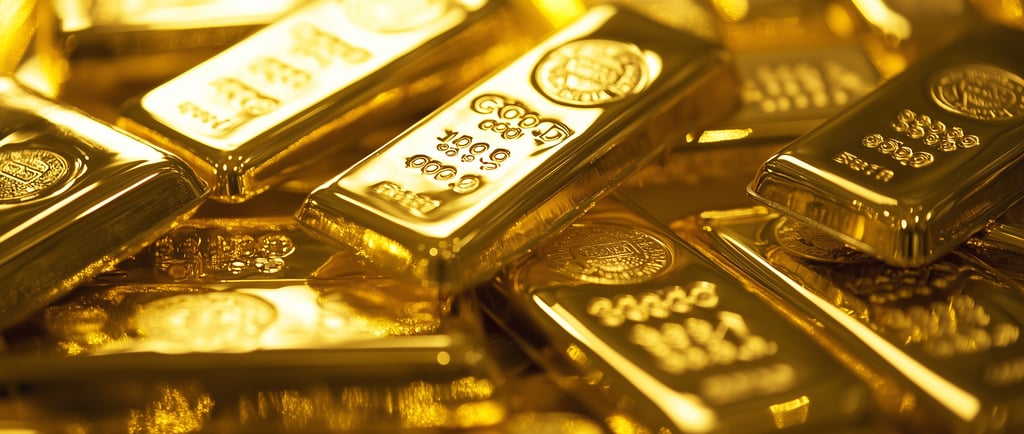

Disclosure: Clicking on links may earn me commission from joining Augusta Precious Metals, at no additional cost to you. Thanks for reading!
Explore the compelling reasons why gold remains a valuable investment, offering stability and potential growth in uncertain times.
Why Invest in Gold? Here's 4 Reasons
Disclaimer: This website and its content are for informational purposes only and is not financial advice.
Gold's potential as an inflation hedge and portfolio diversifier is notable. It often acts as a safe haven asset during economic instability and has the capacity for long-term value growth.
1. Gold Acts as a Hedge Against Inflation
Inflation is a silent thief, eroding the purchasing power of your money over time. When prices for goods and services rise, the value of cash in your bank account or under your mattress declines, leaving investors searching for ways to protect their wealth. This is where gold shines. Historically, gold has maintained its value even as currencies fluctuate, making it a powerful hedge against inflation.
For example, during the high inflation periods of the 1970s, gold prices surged from $35 to $850 per ounce in 1980, a remarkable rise that helped preserve the wealth of those who held it. This period was marked by rising oil prices and government spending, which devalued the dollar. More recently, amid global economic uncertainty and rising inflation in the 2020s, gold hit record highs, showcasing its continued relevance as a protective asset.
While a dollar bought you a certain amount of goods in 1970, that same amount of gold would likely buy you far more today, even accounting for inflation. This is because gold’s supply is limited and its value is not subject to the monetary policies that cause currency devaluation. Unlike paper money, gold cannot be printed or devalued by governments, making it a reliable store of value. When you invest in gold, you’re essentially safeguarding your wealth against the silent threat of inflation, ensuring that your capital retains its purchasing power for years to come.
2. Gold Can Diversify Your Portfolio
Diversification is a cornerstone of smart investing. The age-old advice of "don’t put all your eggs in one basket" is more relevant than ever. Putting all your money into one type of asset—like stocks, bonds, or real estate—exposes you to higher risk if that particular market falters. This is precisely where the unique qualities of gold come into play. Gold, however, often moves independently of traditional investments like stocks and bonds.
The correlation between gold and other major asset classes is often very low, and sometimes even negative. During stock market downturns, such as the 2008 financial crisis or the 2020 pandemic crash, gold prices tended to rise as investors sought safer options. For example, during the market turmoil of 2008, the S&P 500 dropped by nearly 37%, while the price of gold actually increased by over 25%.
This inverse relationship is not guaranteed but has been a consistent pattern over decades, making gold a valuable tool for reducing overall portfolio volatility. By including gold in your portfolio, you reduce overall risk and create a potential financial safety net. This balance is one of the key reasons why investors turn to gold during turbulent times. A small allocation to gold—often 5% to 10% of a portfolio—can significantly improve its risk-adjusted returns without sacrificing growth potential.
This strategy is about balance. When your stocks are down, your gold holdings may be up, helping to cushion the blow and stabilize your net worth. For those wondering why to invest in gold, its ability to act as a counterbalance to other assets is a compelling and fundamental reason. It’s a way to build a more resilient financial structure, one that can withstand shocks and market fluctuations.
3. Gold is a Safe Haven Asset
Global events like wars, political instability, economic crises, or trade disputes can send shockwaves through financial markets. In these moments of crisis, investor confidence in paper assets and currencies can waver.
Gold has consistently proven its worth as a “safe haven” asset, a reliable port in the storm. Investors flock to gold because it is tangible, universally accepted, and not tied to any single government or economy. Its value is recognized worldwide, making it a truly global asset.
The financial world is a complex web of interconnected systems. When one part of the system is stressed, it can create a ripple effect. Gold, as an independent asset, often remains stable or even appreciates during these periods. For instance, during the Russia-Ukraine conflict in 2022, gold prices climbed as investors sought stability amid geopolitical uncertainty.
Similarly, gold tends to perform well during elections, policy shifts, or diplomatic tensions because it offers a refuge from the unpredictable nature of political outcomes. Its status as a financial refuge is a powerful answer to the question of "why should I invest in gold?". This is not just a theoretical concept; it’s a strategy used by institutional investors and central banks worldwide. These entities often increase their gold reserves during times of economic or political stress to protect their national wealth.
The tangible nature of gold also plays a crucial role in its safe-haven status. In a world increasingly reliant on digital assets, having a physical asset that cannot be hacked, deleted, or frozen provides an invaluable layer of security. This makes it an appealing choice for individuals and nations alike.
Updated Sep 6th, 2025
Share this:
4. Gold Offers Long-Term Growth Potential
While gold is often seen as a defensive asset, a way to preserve wealth rather than grow it, this is a misconception. Gold also has significant long-term growth potential. Demand for gold continues to rise, driven by its use in various industries like technology (for electronics), medicine (for dental and other applications), and jewelry, as well as by central banks stockpiling gold reserves. This consistent, multi-faceted demand provides a strong foundation for its value.
Gold is a finite resource; unlike paper currency, which can be printed indefinitely, new gold discoveries are becoming increasingly rare and costly to mine. This scarcity adds to its enduring value and makes it a powerful asset for patient investors.
The World Gold Council reports that central banks have added over 1,000 tons of gold in each of the last three years, a record high. This significant demand from official institutions highlights their belief in gold’s value and its role as a strategic asset.
The combination of industrial demand, central bank buying, and investor interest creates a robust market for gold that supports its long-term appreciation. For patient investors, gold can deliver both stability and growth over decades. It's not a get-rich-quick asset, but a steady performer that can compound returns over a long period.
The Role of Scarcity and Supply & Demand
The value of gold, like any other commodity, is governed by the principles of supply and demand. However, gold’s unique position is defined by its scarcity. Unlike other resources, the total amount of gold ever mined is estimated to be around 216,265 metric tons, and the rate of new discoveries is slowing. The cost of mining is rising, as new gold is harder to find and extract. This limits the supply, ensuring that its value is not diluted by an abundance of new material.
Demand, on the other hand, is driven by multiple factors. The jewelry industry remains the largest consumer of gold, followed by central banks and individual investors. Technology, especially in electronics, also consumes a significant amount of gold due to its high conductivity and resistance to corrosion.
This diverse range of demand sources means that gold’s value is not dependent on a single market or a single use case. This broad-based demand, combined with limited supply, creates a natural upward pressure on its price over the long term, strengthening the case for why you should invest in gold.
Final Thoughts: Why Invest in Gold?
Gold isn’t a get-rich-quick scheme, and its often recommended for it to not replace all other investments. Instead, it should be seen as a foundational element of a smart, diversified portfolio. Its unique qualities—inflation protection, diversification benefits, safe-haven status, and growth potential—make it a timeless asset.
Inflation Hedge: Gold has historically maintained or increased its value during inflationary periods, protecting your purchasing power.
Portfolio Diversifier: Its low correlation with stocks and bonds helps reduce overall portfolio risk and volatility.
Safe Haven: During times of economic or geopolitical uncertainty, gold serves as a trusted refuge, often appreciating when other assets decline.
Long-Term Growth: Driven by consistent demand and its inherent scarcity, gold has a proven track record of long-term value appreciation.
Whether you’re preparing for economic turbulence or building a balanced portfolio for retirement, gold offers a blend of security and opportunity that few other investments can match. Its ability to act as a hedge against inflation and a stabilizer during market crashes makes it an indispensable tool for protecting your wealth. The question of "why invest in gold?" is answered by its proven track record as a store of value and its potential for long-term appreciation.
In a world of financial unpredictability, where currencies fluctuate and markets can turn on a dime, gold remains a steady, proven choice for preserving—and growing—your wealth. It’s an asset that has stood the test of time, and its relevance in today’s financial landscape is as strong as ever.
If you would like to invest in gold, I recommend Augusta Precious Metals. Their commitment to transparency, high-quality service, and client education makes them a top choice.
References
Gold Demand Trends: Full Year 2024 | World Gold Council - Publication Date: February 2025
De-Dollarization? Diversification? Exploring Central Bank Gold Purchases and the Dollar's Role in International Reserves | Federal Reserve - Publication Date: September 2025
Gold Demand: The Role of the Official Sector and Geopolitics | European Central Bank (ECB) - Publication Date: June 2025
Gold Price & Investment Outlook: 2025 & Beyond | VanEck - Publication Date: May 2025
Gold - Price - Chart - Historical Data - News | Trading Economics - Last Updated: November 2025
Subscribe to Newsletter
Get updates on new Gold IRA posts, market news, and more.
By Jordan McCaleb, Precious Metals Investment Researcher


